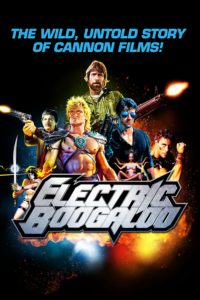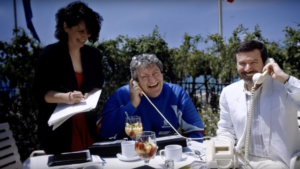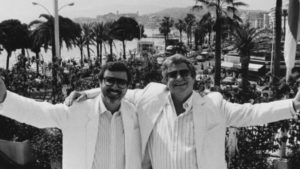Mitchell
Written and directed by Mark Hartley.
 Until I popped this DVD into my player, I don’t think I’d ever heard of Cannon Films, although I consider myself a casual fan of Troma Entertainment, the super-low-budget-film company that seems to be Cannon’s kindred spirit.
Until I popped this DVD into my player, I don’t think I’d ever heard of Cannon Films, although I consider myself a casual fan of Troma Entertainment, the super-low-budget-film company that seems to be Cannon’s kindred spirit.
Electric Boogaloo: The Wild, Untold Story of Cannon Films is a documentary about the rise and fall of a movie production company owned by two cousins who just loved to make movies. Gifted salesmen, they made a career-long practice of coming up with a movie title, creating a movie poster, showing the poster to possible investors, and collecting the money for production, often before a script was written or actors cast.
Their figure-it-out-as-we-go approach often meant budgets far lower than expected, story changes in the middle of filming, and bizarre casting decisions. Yet like Troma, Cannon seemed to figure that low budgets meant easier profits, and they could put out a lot of movies in short amounts of time if they didn’t sweat stuff like quality or cohesion. As long as their films had lots of sex, monsters, and explosions, sometimes in the same scene, they knew people would have a good time and come back for the fifth and sixth sequels.
 When one of the cousins saw a breakdancer on a Los Angeles sidewalk, he immediately set into motion the production of a movie about breaking. He hired the dancers who would be his stars, hurriedly wrote a story about them, and raced through filming because he heard that another studio was filming Beat Street. For Cannon, it was about getting out there first, not best. Breakin’ and Breakin’ 2: Electric Boogaloo were among Cannon’s first hits, but they were not the last.
When one of the cousins saw a breakdancer on a Los Angeles sidewalk, he immediately set into motion the production of a movie about breaking. He hired the dancers who would be his stars, hurriedly wrote a story about them, and raced through filming because he heard that another studio was filming Beat Street. For Cannon, it was about getting out there first, not best. Breakin’ and Breakin’ 2: Electric Boogaloo were among Cannon’s first hits, but they were not the last.
Other well-known hit-or-miss-but-mostly-miss titles the company cranked out are the Happy Hooker and Emmanuelle series, three Death Wish sequels, the American Ninja trilogy, almost every Chuck Norris film including the Missing in Action and Delta Force series, Runaway Train, King Solomon’s Mines, Over the Top, Masters of the Universe, Superman IV: The Quest for Peace, Barfly, Invasion U.S.A., and The Texas Chainsaw Massacre 2. At the same time, it is a hilarious yet impressive filmography. Is there a movie fan older than thirty who hasn’t seen at least a small handful of these pictures?
 Writer-director Mark Hartley interviews nearly thirty actors, producers, and directors about their memories of working for Cannon, including Bo Derek, Sybil Danning, Richard Chamberlain, Dolph Lundgren, Molly Ringwald, Franco Zeffirelli, Cassandra Peterson (Elvira!), Tobe Hooper, Elliot Gould, Robert Forster, and John Avildsen. Some of them have nothing nice to say about their experiences with Cannon, while others wax a bit more nostalgic. The tone is mostly one of amusement, but many contributors admit that there was something valuable about making these films, and something valuable in the films themselves.
Writer-director Mark Hartley interviews nearly thirty actors, producers, and directors about their memories of working for Cannon, including Bo Derek, Sybil Danning, Richard Chamberlain, Dolph Lundgren, Molly Ringwald, Franco Zeffirelli, Cassandra Peterson (Elvira!), Tobe Hooper, Elliot Gould, Robert Forster, and John Avildsen. Some of them have nothing nice to say about their experiences with Cannon, while others wax a bit more nostalgic. The tone is mostly one of amusement, but many contributors admit that there was something valuable about making these films, and something valuable in the films themselves.
In one segment, the directors talk about how the execs at Cannon promised that they would be allowed to make the movies they wanted, with very little interference from leadership. They don’t seem always to have kept the promise, but you can see why such noted filmmakers as Avildsen, Hooper, Zeffirelli, and John Cassavetes would be willing to work with smaller budgets for a company with Cannon’s checkered past. Zeffirelli says his Otello, a Cannon movie, is the best film of his career.
 Would you rather act in a crappy movie or no movie at all? Would you rather direct one with a small budget but creative control, or one with much more backing but much more oversight? These are identity-defining questions, and if nothing else, Cannon offered actors and directors the choice.
Would you rather act in a crappy movie or no movie at all? Would you rather direct one with a small budget but creative control, or one with much more backing but much more oversight? These are identity-defining questions, and if nothing else, Cannon offered actors and directors the choice.
This is a funny documentary and making art is a funny thing. Should lack of talent or resources keep you from the joy of creating? I say no, and if there’s some sincerity in Cannon’s love of making movies, maybe there’s something valuable in the art itself.
I laughed aloud multiple times, and am inspired to check out more of the Cannon team’s work.
8/10
81/100
I just want to give some quick thoughts on this before I got back and re-read Mitchell’s review:
I found the film entertaining and fascinating. I’m not one to be interested in movies that are so bad that they’re good. If they’re really bad, then I find those films boring. But when one of the talking heads described Ninja 3: the Dominion, not only did I laugh out loud, but I actually felt interested in seeing the film. (The concept behind Sahara seemed funny in a insane way.)
With that mind, I don’t think the film really captured the inner workings of the two guys Menahem Golan and Yoram Globus, particularly Golan. I would have wanted to talk to them about whether they really thought their films were really good, equal to the Hollywood films they grew up loving. I’d ask about their (rushed) approached, and ask why not take a slower approach. Anyway…
I know you’re not going to want to hear this, but I couldn’t help but think of Trump when listening to the way the two cousins built their business, made rushed decisions, stayed afloat by salesmanship (con?), sometimes delusional thinking, their brinksmanship, and their eventual crash.
Younger viewers may get the idea that Cannon was different, but I want to say that major studios put out actions films in the 70s and 80s that weren’t that different from Cannon films. I think the fact that a major studio distributed their films is evidence of that. As bad as many of action films are now, a lot of them seem to have eliminated cheesy, cheap violence and nudity. (Well, maybe not the violence.)
Yeah, it would have been great to get some thoughts from the cousins, but of course they were working on their own documentary (which I haven’t been able to track down without having to pay for it) about Cannon at the same time, so they wouldn’t have been available for comment.
When did you see this? Do you have a rating?
I thought it was hilarious that, like the break dancing and lambada movies, they rushed to make their documentary and released it before Hartley’s. You can imagine their thought process: “Hey, this documentary is a great idea. Why go on this guy’s film, and let him profit. Let’s do our own documentary–and release before his!”
In the film, they talk about the way Menahem is someone who loves films and filmmaking, and brings attitude towards producing movies. In other words, he’s more of an artist than a businessman. If I got to talk to him, I’d really try to see to what extent that was true. At some points in the movie, I wonder how genuine this was versus a kind of con. Maybe he started out with a more artistic mindset and then changed over time?
By the way, I forgot to mention that I thought of Ed Wood and the guy who made The Room while watching this. Cannon is like a company Ed Wood would have ran if he had money to make films in the 80s. In any event, examining the three filmmakers, looking for similarities and differences, would have been interesting.
Oh, I saw the film yesterday. I recall seeing it on netflix, and your review piqued my interest.
I thought of Ed Wood and Tommy Wiseau as well (and as I mentioned, it made me think of Troma).
It also made me think of the joy of creating something. When Renee Fleming sings something onstage, she’s creating art. When I sing “House of the Rising Sun” in a karaoke room, I’m doing something else and nobody would ever pay me to do it, but I get joy out of participating. I also get joy out of watching my friends get joy out of participating when they sing their crappy songs.
“Hey now, hey now. Don’t dream it’s over…”
One of my favorite things about National Novel-Writing Month is the community that springs up around it every year. We get together, we write, and we challenge each other to word wars — timed sprints where we each try to put down more words than the others, sometimes with prizes for winners. When the time’s up, participants yell out (or type out: we often meet via instant messaging on Skype) their word totals. People cheer the winner, but they also cheer everyone else. “250” someone will say with some disappointment, and someone else will always say “250 words is better than no words!” and the other will echo the sentiment.
Because writers write.
Whether the Cannon cousins were auteurs or businessmen I guess remains to be determined by a viewing of their own documentary, but what if they were neither, and just love movies so much that the act of producing them was all the joy they needed? I want to think of them this way. Let’s make American Ninja 3 because it’s fun to make movies!
Yes, that would be really cool if they were like that–like the two main characters in Be Kind, Rewind.